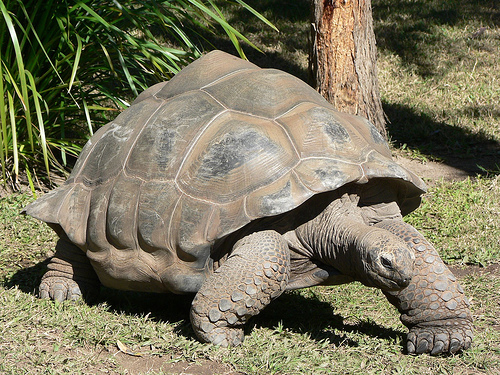Can Turtles Live Up To 500 Years?
Turtles are fascinating creatures that have been around for millions of years. They are known for their longevity, but can they really live up to 500 years? This question has puzzled scientists and the general public alike, and the answer may surprise you.
Many species of turtles have been known to live for over 100 years, and some have even been documented to live up to 200 years. However, the idea of a turtle living for 500 years seems almost unbelievable. In this article, we will explore the evidence behind the lifespan of turtles and uncover the truth behind this intriguing topic.

Can Turtles Really Live Up to 500 Years?
Turtles are one of the most intriguing creatures on the planet. These slow-moving reptiles have fascinated people for centuries, and one of the most intriguing things about them is their long lifespan. It has been said that some turtles can live for up to 500 years! But is this really true? Let’s find out.
What are the Oldest Turtles on Record?
The oldest turtle on record is a giant tortoise named Jonathan, who is estimated to be around 187 years old. He was born in the Seychelles in the late 1800s and has been living on the island of St. Helena since the 1880s. Another famous turtle, Adwaita, was an Aldabra giant tortoise who lived in India and was believed to have lived for over 250 years.
Turtles have been known to live for a very long time, and some species have a longer lifespan than others. For example, the box turtle has an average lifespan of around 50 years, while the Galapagos tortoise can live for over 100 years.
What Makes Turtles Live So Long?
Scientists have been studying the lifespan of turtles for decades, and they have found some interesting things. One of the main reasons why turtles live so long is their slow metabolism. Turtles have a much slower metabolism than most other animals, which means they age at a slower rate.
Another reason why turtles live so long is their ability to regenerate. Turtles have the ability to repair damaged tissues and organs, which helps them stay healthy even as they age.
The Benefits of Living a Long Life
Living a long life definitely has its benefits, and this is true for turtles as well. For one thing, turtles have the opportunity to pass on their genes to many generations. They also have the chance to accumulate knowledge and experience over a long period of time.
Another benefit of living a long life is that turtles are able to adapt to changes in their environment. This is particularly important in today’s world, where human activity is impacting the environment at an unprecedented rate.
The Drawbacks of Living a Long Life
While living a long life has its benefits, there are also some drawbacks. One of the main drawbacks is that turtles are more susceptible to diseases and infections as they age. This is because their immune systems become weaker over time.
Another drawback of living a long life is that turtles are more vulnerable to predators. This is because they become slower and less agile as they age, making them easier targets for predators.
Turtles vs Other Long-Lived Animals
Turtles are not the only animals that live for a long time. There are many other species that have long lifespans, including whales, elephants, and some species of fish. However, turtles are unique in that they have the ability to live for centuries.
One of the main differences between turtles and other long-lived animals is their metabolism. Turtles have a much slower metabolism than other animals, which means they age at a slower rate.
How Humans Can Help Turtles Live Longer
Humans have a big impact on the environment, and this impact can have both positive and negative effects on turtles. One of the best ways humans can help turtles live longer is by protecting their habitats. This means reducing pollution and protecting natural habitats from development.
Another way humans can help turtles live longer is by reducing the number of predators they face. This can be achieved through measures such as fencing off nesting areas and reducing the impact of invasive species.
Conclusion
Turtles are fascinating creatures that have captured our imaginations for centuries. While not all turtles can live for 500 years, some species have been known to live for over 100 years. Turtles live longer than most other animals because of their slow metabolism and their ability to regenerate. While there are drawbacks to living a long life, there are also many benefits. By taking steps to protect turtle habitats and reduce their vulnerability to predators, humans can help these amazing creatures live longer and thrive.
Frequently Asked Questions
Here are some commonly asked questions about turtles and their lifespan.
What is the lifespan of a turtle?
The lifespan of a turtle varies depending on the species. Some turtles can live up to 100 years, while others may only live for 20-30 years. Factors like diet, habitat, and predation can also affect a turtle’s lifespan.
However, it is important to note that the common belief that turtles can live up to 500 years is a myth. No turtle species has been known to live that long.
What is the oldest recorded age of a turtle?
The oldest recorded age of a turtle is 188 years. This record belongs to a species of tortoise called Jonathan, who currently resides on the island of St. Helena in the South Atlantic Ocean. Jonathan was born in 1832 and has been living on the island since the late 1800s.
While Jonathan is the oldest recorded turtle, it is important to note that not all turtles will live this long. Many turtles will live for much shorter periods of time.
How can you tell the age of a turtle?
Determining the age of a turtle can be difficult, as they do not have rings like trees or age-specific markings. One way to estimate the age of a turtle is by looking at its size. Generally, the larger a turtle is, the older it is.
Another way to estimate the age of a turtle is by examining its scutes, or the individual sections of its shell. As a turtle ages, the scutes will begin to wear down and become smoother. By counting the number of rings on each scute, you can estimate the age of the turtle.
Do turtles die of old age?
While turtles can die of old age, they are also susceptible to a variety of other health issues that can lead to their death. Turtles can be affected by diseases, parasites, and environmental factors like pollution and habitat destruction.
In addition, turtles can also be preyed upon by other animals, which can lead to their death. However, if a turtle is able to avoid these threats, it may be able to live a long life and die of old age.
What can you do to help turtles live longer?
One of the best ways to help turtles live longer is by preserving their habitats. Turtles rely on clean water, healthy ecosystems, and appropriate nesting sites to survive. By working to protect these habitats, we can help ensure that turtles have the resources they need to thrive.
In addition, it is important to avoid activities that can harm turtles, such as littering or using harmful chemicals in their habitats. By taking steps to reduce our impact on turtle populations, we can help them live longer and healthier lives.

In conclusion, the idea of turtles living up to 500 years is not fiction. There are certain species of turtles that have a long lifespan, such as the Galapagos tortoise, the Bowhead turtle, and the Red Sea turtle. These species have been known to live for several centuries and are still thriving in the wild today.
However, it should be noted that not all turtles can live up to 500 years. Some turtles have a shorter lifespan and may only live for a few decades. Factors such as habitat, diet, and overall health can also affect a turtle’s lifespan.
Regardless of a turtle’s lifespan, it’s important to remember that they are an important part of the ecosystem. Turtles play a crucial role in maintaining the balance of their habitats and should be protected and preserved for future generations to enjoy.

